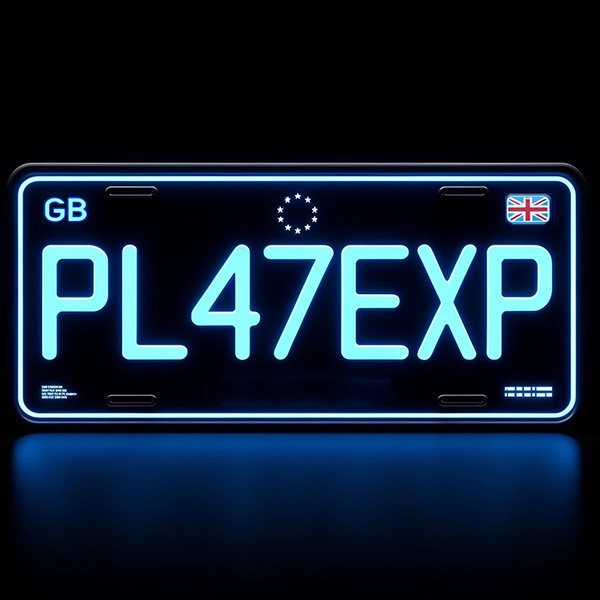In contemplating the future of vehicle registration in the UK, one cannot help but consider the potential advancements and changes on the horizon. As technology continues to evolve at a rapid pace, it is only natural to speculate on how this will impact something as essential as our number plates.
Digital Innovations
 One area that has garnered considerable attention is the concept of digital number plates. Instead of the traditional metal plates affixed to vehicles, we could soon see sleek, digitised displays adorning the front and rear of cars. This shift would not only serve practical purposes but also usher in an era of efficiency and customisation.
One area that has garnered considerable attention is the concept of digital number plates. Instead of the traditional metal plates affixed to vehicles, we could soon see sleek, digitised displays adorning the front and rear of cars. This shift would not only serve practical purposes but also usher in an era of efficiency and customisation.
The potential benefits of digital number plates are significant. Imagine being able to update your number plate with a simple tap on your smartphone, allowing for instant personalisation or compliance with changing regulations. This evolution could also open doors to enhanced safety features, such as displaying real-time information like road conditions or Amber alerts.
However, with innovation comes challenges. The transition to digital number plates would require careful consideration of privacy and security concerns. Questions surrounding data protection and the potential for hacking or unauthorised access would need to be addressed with meticulous attention to detail.
The future of number plates in the UK is a fascinating topic that invites speculation and imagination. From digital displays to eco-friendly materials, the possibilities are vast and varied. As we navigate the evolving landscape of technology and regulation, one thing is certain: the humble number plate is poised for evolution, embracing new technologies while remaining a steadfast symbol of vehicle identification.
Advantages and Challenges
The potential benefits of digital number plates are indeed significant and multifaceted. Picture the convenience of updating your number plate with a mere tap on your smartphone, enabling instant personalisation or seamless compliance with evolving regulations. Such a technological leap promises not only practical advantages but also a newfound level of customisation for vehicle owners across the UK. Moreover, the integration of digital displays could introduce a dynamic element to number plates, potentially enhancing road safety by providing real-time information such as weather updates, road conditions, or urgent alerts like Amber alerts, fostering a safer driving environment for all road users.
Nevertheless, as with any technological innovation, the transition to digital number plates presents its fair share of challenges and considerations. Foremost among these are the critical issues of privacy and security. The digitisation of number plates would necessitate robust safeguards to protect sensitive personal data and guard against the potential risks of unauthorised access or cyber-attacks. Ensuring stringent data protection measures and implementing encryption protocols would be paramount to safeguarding the integrity and security of digital number plate systems. Additionally, regulatory frameworks must be established to address concerns surrounding data privacy and usage rights, striking a delicate balance between technological advancement and individual privacy rights.
Regulatory Considerations
Furthermore, as we delve into the potential implementation of digital number plates, it becomes evident that significant regulatory adjustments will be imperative. The transition to digitised plates would necessitate comprehensive updates to existing regulations and infrastructure to accommodate this innovative technology seamlessly.
Authorities would need to collaborate closely with industry stakeholders to establish robust standards for compatibility and readability. Ensuring that digital number plates are universally compatible with law enforcement systems, automated tolling processes, and other essential infrastructure is paramount to the successful integration of this technology into the existing framework.
Moreover, regulatory bodies must address concerns surrounding data privacy, security, and ownership rights in the context of digital number plates. Clear guidelines must be established to govern the collection, storage, and usage of personal data associated with these plates, safeguarding individual privacy rights while leveraging the benefits of digitisation.
By approaching regulatory considerations with foresight and meticulous attention to detail, policymakers can pave the way for the seamless adoption of digital number plates, unlocking their full potential to enhance efficiency, safety, and convenience in vehicle registration processes across the UK.
Beyond Digital Advancements
 Yet, as we peer into the future of vehicle registration, it becomes evident that the potential for innovation extends far beyond digital advancements. Exciting developments in material science hold promise for revolutionising the very composition of number plates, paving the way for more durable and eco-friendly alternatives. Imagine plates crafted from sustainable materials or embedded with biodegradable components, offering a solution that not only reduces our environmental footprint but also maintains functionality and durability over time.
Yet, as we peer into the future of vehicle registration, it becomes evident that the potential for innovation extends far beyond digital advancements. Exciting developments in material science hold promise for revolutionising the very composition of number plates, paving the way for more durable and eco-friendly alternatives. Imagine plates crafted from sustainable materials or embedded with biodegradable components, offering a solution that not only reduces our environmental footprint but also maintains functionality and durability over time.
Moreover, the convergence of technology and design opens up intriguing possibilities for the integration of augmented reality (AR) features into number plates. With advancements in AR technology, we could envision plates adorned with dynamic displays or interactive elements, transforming them into interactive informational hubs. Pedestrians and other drivers could benefit from real-time information displayed on these plates, such as navigation cues, hazard alerts, or even localised advertisements, enhancing safety and convenience on the roads.
By exploring these alternative avenues of innovation, we can envision a future where number plates not only fulfil their primary function of vehicle identification but also contribute to a more sustainable and interconnected transportation ecosystem. As we continue to push the boundaries of technological advancement and environmental stewardship, the possibilities for reimagining the humble number plate are truly boundless.
Finally
In conclusion, it’s undeniable that the future of number plates in the UK is brimming with possibilities and opportunities for innovation. From the potential introduction of digital displays to the exploration of eco-friendly materials, the trajectory of development is both vast and varied. As we navigate the intricate landscape of evolving technology and regulation, one thing remains clear: the humble number plate stands on the cusp of a significant evolution.
Embracing new technologies while upholding its fundamental role as a way of identifying vehicles, the number plate is primed to adapt and thrive in the digital age. By fostering a balance between innovation and tradition, we can ensure that future advancements enhance not only efficiency but also sustainability and safety on the roads. As we embark on this journey of transformation, the future of number plates promises to be both exciting and impactful for drivers across the UK.



